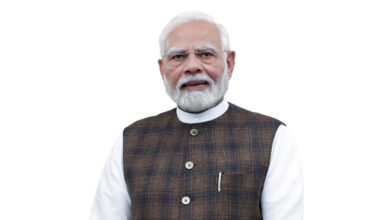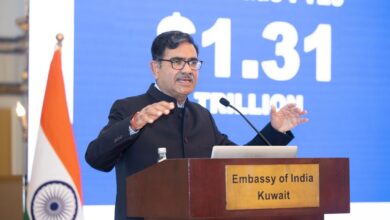India to embrace quantum technology to revolutionize defence operations

On November 08, 2024 at the Annual Niche Technology Nexus (NTN-2024) seminar, titled ‘Innovating Tomorrow’s Battlefront with Quantum and Electronic Mastery,’ India’s Chief of Defence Staff General Anil Chauhan highlighted the transformative potential of quantum technology in modern warfare, emphasizing its strategic importance for India’s armed forces.
Quantum technology is emerging as a revolutionary force that could redefine the nature of military capabilities worldwide.
From quantum computing and quantum communication to quantum sensing, the field presents myriad possibilities that can radically enhance defence systems, intelligence, and operational security.
“Quantum Technology will impact future wars with far-reaching outcomes for the armed forces,” General Chauhan said in his address, underscoring the urgency for India to embrace this powerful technology, both to strengthen its own defences and to secure a strategic edge in an increasingly complex geopolitical landscape.
General Chauhan further stressed the transformative potential of integrating Artificial Intelligence, Machine Learning, and Quantum Technologies into Electronic Warfare (EW) systems, asserting that these advancements will reshape the future of military operations.
The CDS said, by investing in research, fostering collaborations, and cultivating a skilled workforce, the armed forces, in partnership with the Defence Technology & Production Eco-systems, can secure a leading position globally in Quantum and EW technologies.
Quantum Computing: Reimagining military capabilities
Quantum computing holds the potential to revolutionize the computational abilities of military systems.
Unlike classical computers, which process information in binary (0s and 1s), quantum computers harness qubits, enabling them to exist in multiple states simultaneously.
This property, known as superposition, allows quantum computers to perform complex calculations at unprecedented speeds.
For the armed forces, this means vastly improved capabilities in simulations, cryptography, and decision-making processes.
Military operations increasingly rely on vast amounts of data—whether analyzing enemy movements, weather patterns, or satellite imagery.
Quantum computing could exponentially accelerate data processing times, allowing for rapid analysis and deployment of strategies.
Additionally, the encryption-breaking potential of quantum computers presents both a challenge and an opportunity.
While they could compromise current encryption methods, they also allow for the development of quantum-resistant cryptographic protocols, ensuring that sensitive military communications remain secure in the future.
Quantum Communication: Ensuring secure military networks
The demand for secure communication channels is paramount in modern warfare, where intercepted information can lead to significant strategic disadvantages.
Quantum communication, leveraging principles such as quantum key distribution (QKD), offers unparalleled security.
Unlike classical communication channels, which can be intercepted, quantum communication relies on the principle of entanglement.
If an unauthorized party attempts to intercept or eavesdrop on a quantum network, the quantum state changes, thereby alerting users to a breach.
General Chauhan emphasized the need for India to develop a robust quantum communication network for secure military communication and data transfer.
This could not only protect India’s command and control systems but also safeguard intelligence and ensure the integrity of sensitive data.
Several countries, notably China, have already made significant progress in this domain, developing quantum communication satellites and secure ground-based networks.
For India, achieving similar advancements is vital for maintaining secure and resilient communication infrastructures that can withstand evolving cyber threats.
Quantum Sensing: Enhanced situational awareness and surveillance
Quantum sensing, another branch of quantum technology, is rapidly gaining attention for its potential applications in military surveillance and navigation.
Quantum sensors, which utilize the unique properties of quantum states, can detect minute changes in environmental conditions, such as gravitational fields, electromagnetic signals, and even seismic vibrations.
This level of sensitivity could lead to groundbreakingadvancements in radar systems, GPS-independent navigation, and underwater and underground detection.
For instance, quantum radar systems could potentially detect stealth aircraft and submarines, overcoming limitations of traditional radar technologies. In a combat scenario, this would provide India’s armed forces with enhanced situational awareness, enabling them to track enemy assets with greater accuracy.
Quantum-enhanced navigation systems could also be invaluable in GPS-denied environments, such as dense urban landscapes or remote terrain.
As adversaries develop advanced anti-satellite weapons capable of disrupting conventional GPS networks, quantum sensing could offer a resilient alternative for location and navigation.
Transforming cybersecurity in military operations
The digital transformation of defence systems has brought forth a new era of cybersecurity challenges.
Military assets, including drones, communication networks, and critical infrastructure, are now more susceptible to cyberattacks, which could cripple operations or compromise sensitive information.
Quantum technology could enhance cybersecurity protocols within military networks, making them more resistant to hacking attempts.
Quantum cryptography, for example, uses quantum principles to generate encryption keys that are virtually impossible to decipher without detection.
Furthermore, quantum-based algorithms could be employed to identify vulnerabilities in defence networks and provide real-time solutions to patch them.
This could reduce the likelihood of a cyber breach, allowing the armed forces to operate with greater confidence in their digital security.
General Chauhan’s emphasis on quantum technology highlights the importance of integrating these advancements into cybersecurity frameworks, ensuring that India’s military data and operations remain shielded against future cyber threats.
Strategic implications of Quantum Technology for India’s defence landscape
General Chauhan’s focus on quantum technology at NTN-2024 also underscores its broader strategic implications.
In the context of India’s defence modernization efforts, adopting quantum technology offers several advantages.
It not only strengthens the country’s military capabilities but also positions India as a key player in the global defence landscape.
Quantum technology is expected to play a central role in the defence strategies of major powers, with countries like the United States, China, and Russia investing heavily in quantum research and development.
For India, closing the quantum technology gap with these nations is essential to maintaining its strategic autonomy and defending its interests in an increasingly polarized world order.
India’s geographical location also adds to the strategic importance of quantum technology.
Border security is a constant priority, particularly with neighbouring countries possessing advanced military capabilities.
Quantum sensing and quantum communication technologies could play a pivotal role in monitoring border activities and ensuring secure communication channels between command centres and frontline troops.
In the Indian Ocean region, where maritime security and underwater monitoring are critical, quantum technologies could significantly enhance India’s capabilities to detect, monitor, and respond to potential threats.
To leverage the full potential of quantum technology, collaboration between India’s defence forces, research institutions, and private sector is crucial.
Establishing partnerships with global leaders in quantum technology can help India accelerate its research and development efforts.
At the same time, it is important to foster indigenous innovation.
By developing its own quantum research centres, training a skilled workforce, and incentivizing startups and academic institutions to work on quantum technology, India can build a strong foundation for sustained technological progress.
The Indian government has already recognized the importance of quantum technology through initiatives like the National Mission on Quantum Technologies and Applications (NM-QTA), which aims to develop a strong ecosystem for quantum research and applications within the country.
For the armed forces, General Chauhan’s emphasis on quantum technology reflects a broader commitment to integrating cutting-edge solutions in defence strategy, ensuring that India is prepared to meet the demands of future warfare.
Quantum technology represents a transformative force in modern warfare, with applications that could redefine military capabilities, cybersecurity, and strategic positioning.
General Anil Chauhan’s address at the NTN-2024 seminar emphasized the critical role of quantum technology in securing India’s defence interests and ensuring that the country remains competitive on the global stage.
By investing in quantum computing, communication, and sensing technologies, India’s armed forces can bolster their operational efficiency, protect sensitive data, and maintain an advantage in an era of evolving security threats.
As the landscape of warfare continues to shift, embracing quantum technology offers India the means to safeguard its sovereignty, reinforce its military strength, and secure a strategic position in a technologically advanced world.












